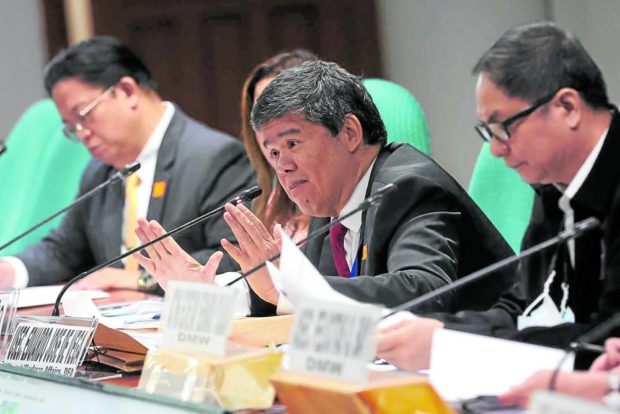
‘WE DON’T GET A LOT OF ACQUITTALS’| Department of Foreign Affairs (DFA) Undersecretary for Migrants Workers Eduardo De Vega explains his agency’s side during a hearing by the Senate committee on migrant workers which tackled the zero acquittal rate last year in the DFA’s assistance to overseas workers convicted abroad. (Photo by NIÑO JESUS ORBETA / Philippine Daily Inquirer)
MANILA, Philippines — None of the more than 1,000 overseas Filipino workers (OFWs) who received legal aid from the government last year as they faced trial abroad were spared conviction and imprisonment, the Department of Foreign Affairs (DFA) reported to the Senate on Tuesday.
At a hearing by the Senate Committee on Migrant Workers, senators expressed disbelief that all 1,278 Filipino workers who were charged criminally in the first half of 2022 ended up convicted and serving prison terms.
This showed the government’s “sloppy” defense and poor legal assistance in their behalf, Senate Majority Leader Joel Villanueva said.
More details needed
“This is not acceptable. These are facts. These are figures that we have in our hands. If we cannot even get anyone acquitted, then what the hell are we doing here?” he told DFA officials at the inquiry, as he pointed out their own report which showed that no criminal case against an OFW as handled by the department had led to an acquittal.
The Senate panel was tackling three bills — authored by Villanueva and Senators Grace Poe and Francis Tolentino — that seek to expand the government’s legal assistance program for OFWs.
According to the DFA’s own data, 883 of the convicted OFWs are serving fixed-term sentences, while 63 are serving life prison terms and 332 have already served their sentences.
The department further reported that 837 occurred in the Asia-Pacific region, followed by 288 in the Middle East, 110 in the Americas, 40 in Europe, and three in Africa.
The DFA, however, did not have further details on what charges were filed against those OFWs. It also didn’t have more recent figures apart from the first half of 2022.
The committee, headed by Sen. Raffy Tulfo, directed the agency to submit the full numbers from the last five years.
‘Better than nothing’
Villanueva fired off a series of questions at the DFA officials: “Have they been even conducting evidence gathering? Were the convictions due to weak evidence? Or were there problems with the mechanisms? Or is the assistance really lacking?”
He also asked if the department evaluates the lawyers it taps to defend the distressed OFWs.
Responding to the senator, Eduardo De Vega, DFA’s undersecretary for migrant workers, conceded that the agency had been struggling to get cases against OFWs dismissed.
“Offhand, [I can say that] we don’t get a lot of acquittals, maybe a maximum of a dozen a year,” he said, without citing official figures.
He claimed that the record of acquittals was low because OFWs have resorted to settlements with their accusers.
Tulfo urged the DFA to hire top-caliber lawyers, as he expressed skepticism that those engaged by the agency were “pipitsugin” or incompetents.
“Out of the hundreds or even thousands who have been charged, you only managed to get about a dozen acquitted—that does not sound pleasing to the ears,” he said.
De Vega replied: “Again, the position of DFA is that: bottom line, [OFWs] get legal representation which is better than nothing.”
Tulfo cut him off, saying, “I’m sorry, sir. Don’t say that. It is your duty to provide every Filipino with legal assistance because that is part of your mandate, which is to help and spend for every Filipino in distress, and which is why we have legal assistance funds.”
De Vega pointed out that the DFA had achieved success in a number of cases in which the OFWs were the complainants. He also said there were other cases in which the department was able to secure a lower penalty.
None of the cases cited by the DFA involved capital punishment, and there was no OFW on death row who was executed last year.
Executed OFWs
As of November last year, there were 65 Filipinos on death row abroad.
In September 2022, the DFA sought executive clemency for Mary Jane Veloso, an OFW who has been detained in Indonesia since her arrest and sentencing for drug trafficking in 2010.
In April 2015, she was supposed to be executed by firing squad, but then President Benigno Aquino III made a last-ditch plea for mercy from the Indonesian government. She was spared after being granted a reprieve.
Earlier in March, Joven Esteva, who was working as a family driver in Saudi Arabia, was beheaded after he was convicted of murder in 2007 for killing his employer and injuring the latter’s son.
In December that year, Joselito Zapanta was executed in Saudi Arabia five years after he was convicted of robbing and murdering a Sudanese national.
In January 2017, Jakatia Pawa was executed by hanging in Kuwait, almost a decade after she was accused of murdering her employer’s 22-year-old daughter while asleep. This month, some 50 OFWs in distress were repatriated from Kuwait, the first batch of the 300 scheduled to return home in January, after a high-level Department of Migrant Workers team visited the Middle Eastern country to check on their living conditions in government-run shelters.
Undersecretary Hans Cacdac said the group met with several Kuwaiti officials to discuss the reduction of the number of welfare cases of OFWs, particularly runaway domestic workers who had fled from abusive employers.